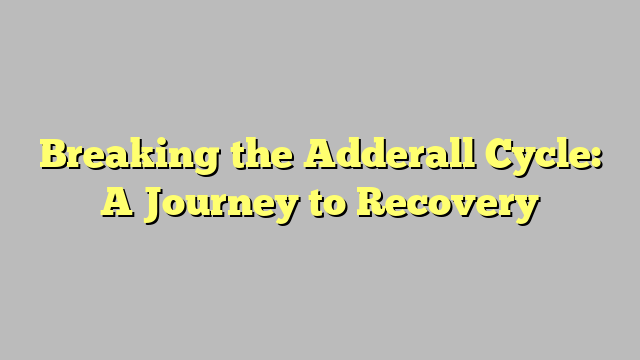Adderall addiction can silently creep into one’s life, starting as a solution for increased focus and energy, and then transforming into a cycle that feels impossible to break. The initial allure of heightened performance and productivity can quickly give way to dependence, affecting both physical and mental health. Many individuals find themselves trapped in this cycle, struggling to break free from the grip of Adderall addiction. The journey to recovery may seem daunting, but with the right support and determination, it is possible to reclaim control and break free from the chains of addiction.
Recognizing the Signs
Adderall addiction can often go unnoticed, as individuals may initially believe they are simply using the medication as prescribed. However, there are key indicators that may signal a developing problem. Frequent and increasing cravings for Adderall, along with a sense of dependency on the medication to function, can be early warning signs that addiction is taking hold.
Physical symptoms may also manifest as a result of Adderall addiction. These can include rapid weight loss, insomnia, and a noticeable increase in heart rate and blood pressure. Individuals struggling with addiction may also exhibit erratic behavior, such as unexplained mood swings, agitation, or aggression. Recognizing these physical and behavioral changes is crucial in identifying an addiction to Adderall.
Another important sign to watch for is the presence of withdrawal symptoms when Adderall use is reduced or stopped. These may include fatigue, depression, and intense cravings for the medication. In severe cases, individuals may experience hallucinations or become paranoid. Acknowledging these withdrawal symptoms is essential in addressing the addiction and taking steps toward recovery.
Seeking Help
When it comes to overcoming Adderall addiction, seeking help is crucial. Trying to navigate this journey alone can be overwhelming and challenging for anyone caught in the Adderall cycle. Reaching out for support is the first step towards breaking free from the grip of addiction.
Whether it’s confiding in a trusted friend, reaching out to a counselor, or joining a support group, finding someone to talk to about your struggles is essential. Sharing your experiences and feelings with others who understand what you’re going through can provide a sense of relief and validation. It’s important to remember that you are not alone in this battle.
Professional help is also available for those seeking to break the Adderall cycle. Consulting with a healthcare provider or addiction specialist can offer tailored guidance and treatment options to support your recovery journey. From therapy sessions to medication-assisted treatment, there are various resources and strategies that can assist in your path to overcoming Adderall addiction.
Rebuilding a Healthy Lifestyle
Recovery from Adderall addiction involves creating a new daily routine focused on well-being. Establishing consistent sleep patterns, eating nutritious meals, and engaging in regular exercise are key components of rebuilding a healthy lifestyle. Prioritizing self-care and setting boundaries to avoid triggers can support long-term recovery efforts.
When transitioning away from Adderall use, incorporating mindfulness practices such as meditation or yoga can help manage stress and cravings. Connecting with supportive relationships and seeking professional guidance through therapy or counseling can also aid in the recovery process. By fostering a nurturing environment for both physical and mental health, individuals can gradually restore balance to their lives.
Adderall Addiction
It is essential to remember that recovery is a journey, and setbacks may occur along the way. Staying committed to self-improvement and remaining resilient in the face of challenges are vital for overcoming Adderall addiction. Celebrating small victories and practicing gratitude can reinforce positive behaviors and contribute to sustained well-being.




